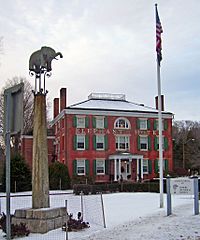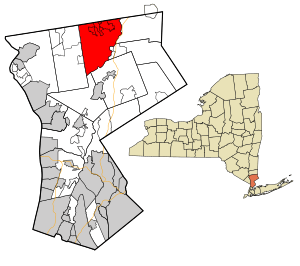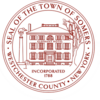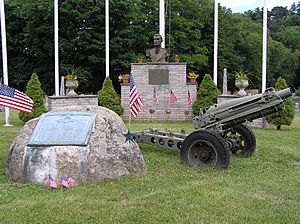Somers, New York facts for kids
Quick facts for kids
Somers, New York
|
||
|---|---|---|
| Town of Somers | ||

The Elephant Hotel, the town hall of Somers, in 2007
|
||
|
||

Location of Somers, New York
|
||
| Country | ||
| State | ||
| County | Westchester | |
| Area | ||
| • Total | 32.16 sq mi (83.29 km2) | |
| • Land | 29.64 sq mi (76.77 km2) | |
| • Water | 2.52 sq mi (6.52 km2) | |
| Elevation | 381 ft (116 m) | |
| Population
(2020)
|
||
| • Total | 21,541 | |
| • Density | 669.81/sq mi (258.626/km2) | |
| Time zone | UTC-5 (Eastern (EST)) | |
| • Summer (DST) | UTC-4 (EDT) | |
| ZIP code |
10589
|
|
| Area code(s) | 914 (845 in some portions of Heritage Hills) | |
| FIPS code | 36-68308 | |
| GNIS feature ID | 0979503 | |
| Website | http://www.somersny.com/ | |
Somers is a town located in northern Westchester County, New York, in the United States. In 2020, about 21,541 people lived there. You can travel to Manhattan from Somers using the Metro-North Commuter Railroad. The train ride usually takes about 65 to 75 minutes.
Contents
History of Somers
Early Days and Name Change
Long ago, the land where Somers is now was home to Native Americans. They were called Kitchawanks and were part of the Wappinger tribe. They named the land Amapaugh, which means "fresh water fish."
In 1697, a large area of land, including what became Somers, was given to Stephanus Van Cortlandt. European settlers began to arrive after 1700. These early settlers included people from England, the Netherlands, France, and Quakers.
The town was first named Stephentown in 1788. But there was already another Stephentown in New York! So, in 1808, the name was changed to Somers. This was to honor Richard Somers, a brave naval captain from New Jersey. He died fighting in the First Barbary War, a conflict between the United States and North African states. A memorial was built for him in West Somers Park in 1958.
Growth and Changes
In the early 1800s, Somers had many businesses. There were factories that made hats and carriages. There were also hotels, stores, an iron mine, and a milk factory. A weekly newspaper, the Somers Museum and Westchester County Advertiser, even started in 1809.
The town was mostly about farming. But it also had weavers, merchants, doctors, and teachers. Roads were good, and some were "toll roads" where you paid to use them.
When railroads were built in the 1840s, they didn't come through Somers directly. This slowed the town's growth for a long time. However, the railroad in nearby towns helped farmers send their dairy products and fruits to big cities.
Later, between 1890 and 1910, parts of the Croton and Muscoot rivers were flooded. This created the New York City reservoir system, which changed the landscape a lot.
After World War II, more people started visiting Somers for vacations. Many came from New York City, especially as cars became more common. When Interstate 684 was built in the 1970s, it made it easier to get to Somers. This led to more homes and businesses being built. Somers grew quickly in the 1980s and 1990s when big companies like IBM and PepsiCo built offices there.
The Circus Connection
Somers is famous for being the "cradle of the American circus". This is because of a man named Hachaliah Bailey. He bought an African elephant named "Old Bet". Bailey first wanted Old Bet to help with farm work. But so many people came to see her that he started taking her on tour around the Northeast.
Bailey's success inspired many others to travel with exotic animals. By the 1830s, these animal shows and older circus acts combined to create the modern circus we know today. Old Bet died in 1827 while on tour.
Later, Bailey built the Elephant Hotel in Somers to honor Old Bet. The town bought it in 1927. It's a special landmark and became a National Historic Landmark in 2006. The elephant is still a symbol of Somers. The high school sports teams are even called the "Tuskers"! Today, the Elephant Hotel is the Somers Town Hall.
Historic Places
Several buildings and areas in Somers are listed on the National Register of Historic Places. This means they are important historical sites. They include:
- The Mount Zion Methodist Church
- The Gerard Crane House
- The Elephant Hotel
- The Somers Business Historic Preservation District
- Bridge L-158
- The West Somers Methodist Episcopal Church and Cemetery
Geography and Climate
Location and Size
Somers covers about 32.3 square miles (83.7 square kilometers). Most of this area is land, with about 2.2 square miles (5.7 square kilometers) being water.
Somers is bordered by several other towns:
- To the north: Carmel in Putnam County
- To the east: North Salem
- To the south: Lewisboro, Bedford, and New Castle
- To the west: Yorktown
Major roads like U.S. Route 202 and U.S. Route 6 pass through the town.
Weather in Somers
| Climate data for Yorktown Heights, New York | |||||||||||||
|---|---|---|---|---|---|---|---|---|---|---|---|---|---|
| Month | Jan | Feb | Mar | Apr | May | Jun | Jul | Aug | Sep | Oct | Nov | Dec | Year |
| Record high °F (°C) | 67 (19) |
73 (23) |
85 (29) |
95 (35) |
94 (34) |
94 (34) |
100 (38) |
100 (38) |
95 (35) |
87 (31) |
79 (26) |
73 (23) |
100 (38) |
| Mean daily maximum °F (°C) | 35.5 (1.9) |
38.6 (3.7) |
46.8 (8.2) |
59.7 (15.4) |
69.6 (20.9) |
78.0 (25.6) |
83.0 (28.3) |
81.1 (27.3) |
74.4 (23.6) |
62.5 (16.9) |
51.4 (10.8) |
40.8 (4.9) |
60.1 (15.6) |
| Mean daily minimum °F (°C) | 16.7 (−8.5) |
17.9 (−7.8) |
25.4 (−3.7) |
35.9 (2.2) |
47.8 (8.8) |
55.2 (12.9) |
60.8 (16.0) |
59.3 (15.2) |
51.9 (11.1) |
40.9 (4.9) |
31.5 (−0.3) |
23.3 (−4.8) |
38.9 (3.8) |
| Record low °F (°C) | −15 (−26) |
−10 (−23) |
0 (−18) |
14 (−10) |
30 (−1) |
38 (3) |
46 (8) |
39 (4) |
32 (0) |
20 (−7) |
11 (−12) |
−9 (−23) |
−15 (−26) |
| Average precipitation inches (mm) | 3.72 (94) |
3.06 (78) |
4.10 (104) |
3.89 (99) |
3.91 (99) |
5.00 (127) |
4.32 (110) |
4.28 (109) |
4.80 (122) |
4.61 (117) |
4.24 (108) |
4.37 (111) |
50.30 (1,278) |
| Average snowfall inches (cm) | 8.8 (22) |
12.6 (32) |
8.2 (21) |
1.8 (4.6) |
0 (0) |
0 (0) |
0 (0) |
0 (0) |
0 (0) |
0 (0) |
0.5 (1.3) |
7.6 (19) |
39.50 (100.3) |
| Average precipitation days | 11.1 | 8.6 | 10.5 | 11.1 | 11.6 | 11.3 | 10.3 | 9.9 | 8.9 | 9.4 | 9.1 | 10.5 | 122.3 |
| Average snowy days | 5.2 | 4.1 | 3.3 | 0.4 | 0 | 0 | 0 | 0 | 0 | 0 | 0.5 | 3.4 | 16.9 |
| Source: NOAA | |||||||||||||
Population of Somers
| Historical population | |||
|---|---|---|---|
| Census | Pop. | %± | |
| 1790 | 1,297 | — | |
| 1820 | 1,841 | — | |
| 1830 | 1,997 | 8.5% | |
| 1840 | 2,082 | 4.3% | |
| 1850 | 1,722 | −17.3% | |
| 1860 | 2,012 | 16.8% | |
| 1870 | 1,721 | −14.5% | |
| 1880 | 1,630 | −5.3% | |
| 1890 | 1,897 | 16.4% | |
| 1900 | 1,338 | −29.5% | |
| 1910 | 1,228 | −8.2% | |
| 1920 | 1,117 | −9.0% | |
| 1930 | 1,514 | 35.5% | |
| 1940 | 2,406 | 58.9% | |
| 1950 | 3,159 | 31.3% | |
| 1960 | 5,468 | 73.1% | |
| 1970 | 9,402 | 71.9% | |
| 1980 | 13,133 | 39.7% | |
| 1990 | 16,216 | 23.5% | |
| 2000 | 18,346 | 13.1% | |
| 2010 | 20,434 | 11.4% | |
| 2020 | 21,541 | 5.4% | |
| U.S. Decennial Census | |||
In 2010, there were 20,434 people living in Somers. There were 6,802 households, and 5,169 families. About 33% of households had children under 18. Most households (68.5%) were married couples living together.
The population included people of different backgrounds:
- 94.81% White
- 1.7% African American
- 1.86% Asian
- 2.96% Hispanic or Latino
The median age in Somers was 42 years old. This means half the people were younger than 42 and half were older.
Education in Somers
The Somers Central School District is in charge of public schools in Somers. It includes:
- Primrose Elementary School
- Somers Intermediate School
- Somers Middle School
- Somers High School (for grades 9–12)
The Community YMCA of Northern Westchester offers programs for students before and after school. They also have a summer camp for local children.
Communities and Locations
Somers has several smaller communities and areas within it:
- Amawalk – Home to the Amawalk Friends Meeting House.
- Amawalk Reservoir – A large body of water in the northern part of town.
- Granite Springs – A small residential area.
- Greenbriar – A housing development with townhouses and single-family homes.
- Heritage Hills – A community with townhomes.
- Lake Lincolndale – A community near the northern county line.
- Lake Purdy – A lake community close to Interstate 684.
- Lake Shenorock – Another community north of the Amawalk Reservoir.
- Lincolndale – A community where two main roads meet.
- Primrose Farms – A living community near Reis Park.
- Shenorock – A community near the northern county line.
- Somers – The main hamlet (a small settlement) of the town.
- Somers Chase – A housing development.
- Somers Commons – A shopping area.
- The Willows – A townhouse development.
- Whitehall Corners
Points of Interest
There are many interesting places to visit in Somers:
- Angle Fly Preserve – A natural area managed by the Somers Land Trust.
- Bridge L-158 – A unique old rail bridge.
- Elephant Hotel – The historic town hall and symbol of Somers.
- Lake Lincolndale
- Lake Purdy
- Lasdon Park and Arboretum – A park with beautiful trees and plants.
- Muscoot Farm – A working farm where you can see animals and learn about farm life.
- Old Stone House – A historic house.
- Reis Park & the Wright Reis Homestead – A park with sports fields and a historic home.
- Somers Library – The town's public library.
Reis Park
Reis Park was named after Carolyn Reis, who gave the land to the community in 1966. The park has many facilities for sports and fun. You can play baseball, softball, basketball, soccer, or tennis there. There's also a jungle gym for kids and a place to buy snacks.
Notable People from Somers
Many interesting people have connections to Somers:
- Hachaliah Bailey – The person who started the American circus with his elephant, Old Bet.
- Anne Beatts – Grew up in Somers and became one of the first writers for Saturday Night Live. She also created the TV show Square Pegs.
- Billy Collins – A former United States Poet Laureate, which means he was a very important poet for the country.
- Jeff Gorton – An executive for the Montreal Canadiens hockey team.
- Bronson Pinchot – An actor known for playing Balki in the TV show Perfect Strangers.
- Brian Span – A professional soccer player.
- Andrew Yang – An entrepreneur and lawyer who ran for president in 2020.
See also
 In Spanish: Somers (Nueva York) para niños
In Spanish: Somers (Nueva York) para niños
 | Jessica Watkins |
 | Robert Henry Lawrence Jr. |
 | Mae Jemison |
 | Sian Proctor |
 | Guion Bluford |



